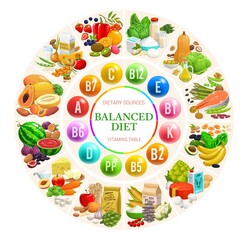Micronutrient:
Beside energy yielding substances, micronutrient (vitamin and minerals) play an important role to support normal body functions. Vitamins are amongst essential nutrient that are recommended in minute quantities.
They play a vital role in growth, maintenance of health and reproduction. They are categorized in to water-soluble (all B vitamin and vitamin C)and fat-soluble vitamins(A,D,E and K) .Likewise, minerals are in organic element involved in body building(bones and teeth) and regulation of body processes.
Minerals are classified in major (required in higher amount i.e >100 mg/day) and minor( recommended in smaller quantities) minerals. Calcium, chloride, magnesium, phosphorus, potassium, sodium, and Sulphur are major minerals while copper, iodine, iron, manganese, selenium and zinc are categorized as minor minerals.
Vitamins;
vitamin are the important organic compound in food other than the energy yielding nutrient(carbohydrates, proteins, and fats). Their need can be fulfilled by food or supplements because the body is unable to synthesize them in inadequate amounts. Most vitamins function as coenzymes or cofactors. Both deficiency and excessive intake of vitamins can lead different diseases or disorders as discussed below.
here are some common vitamins and their natural sources:
Vitamin A: Carrots, sweet potatoes, spinach, and kale.
Vitamin B1 (Thiamine): Whole grains, pork, trout, and beans.
Vitamin B2 (Riboflavin): Milk, cheese, leafy green vegetables, and liver.
Vitamin B3 (Niacin): Chicken, tuna, turkey, and salmon.
Vitamin B5 (Pantothenic Acid): Sunflower seeds, avocado, and salmon.
Vitamin B6 (Pyridoxine): Chickpeas, beef liver, and tuna.
Vitamin B7 (Biotin): Eggs, almonds, and spinach.
Vitamin B9 (Folate or folic acid): Leafy green vegetables, asparagus, and lentils.
Vitamin B12 (Cobalamin): Fish, shellfish, dairy, and organ meats.
Vitamin C: Oranges, strawberries, bell peppers, and broccoli.
Vitamin D: Fatty fish, cheese, and fortified dairy products.
Vitamin E: Almonds, spinach, and sweet potato.
Vitamin K: Green leafy vegetables, broccoli, and Brussels sprouts.
Note: Fortified products, such as cereals or plant-based milks, can also be good sources of vitamins, especially for those on vegan or other restrictive diets. Always read nutrition labels to determine nutrient content.
Fat-soluble vitamins;
- They are first absorbed in the lymph thin in blood
- They require protein carriers
- They are stored in the adipocytes (cells that deposit fat)
- They tend to remain in fat storage reserves, hence less readily excreted
- Regular consumption of fat- soluble vitamin from supplements may attain toxic levels
- They are required in periodic (week or month )doses
Minerals;
Minerals are inorganic nutrient essentially required by the body in small quantities to perform wide range of functions. They are essential components of body fluid involved in the formation of teeth and bones, act as coenzymes and participate in nerve functions.
Minerals requirement differ depending upon age gender, physiological state (pregnancy) and health status. Some of the minerals are easily absorbed in the blood, move freely and are excerpted by the kidneys-while others need carriers to get a absorbed and transported.
If taken amounts lower than require, minerals can lead to deficiency diseases and disorders, while excessive amounts can pose serious toxicity.
Here are some common minerals and their dietary sources:
Calcium: Dairy products, green leafy vegetables, fortified non-dairy milks.
Iron: Red meat, poultry, beans, nuts, dried fruits.
Magnesium: Green leafy vegetables, nuts, seeds, and whole grains.
Zinc: Oysters, red meat, poultry, beans, nuts.
Potassium: Bananas, oranges, cantaloupes, raisins, dates, spinach.
Phosphorus: Dairy products, meat, fish, eggs, nuts, beans.
Sodium: Table salt, processed foods, some vegetables like beetroot.
Copper: Shellfish, whole grains, nuts, beans, potatoes.
Manganese: Nuts, legumes, whole grains, tea.
Selenium: Brazil nuts, fish, shellfish, red meat, grains.
Iodine: Seaweed, fish, dairy, iodized salt.
These minerals are essential for various bodily functions, including nerve function, enzyme reactions, bone health, and more. Balanced intake of these minerals is crucial for maintaining overall health.
what is main micronutrient?
Define fat-soluble vitamins?
Define mineral requirement?
What are micronutrients and why are they important for our health?
Can you list three examples of micronutrients and their roles in the human body?
What happens if our body is deficient in certain micronutrients?
How can we ensure that we are getting enough micronutrients from our diet?
What are the potential risks of consuming too much of certain micronutrients?








No comments:
Post a Comment
please do not enter spam link in the comment box.